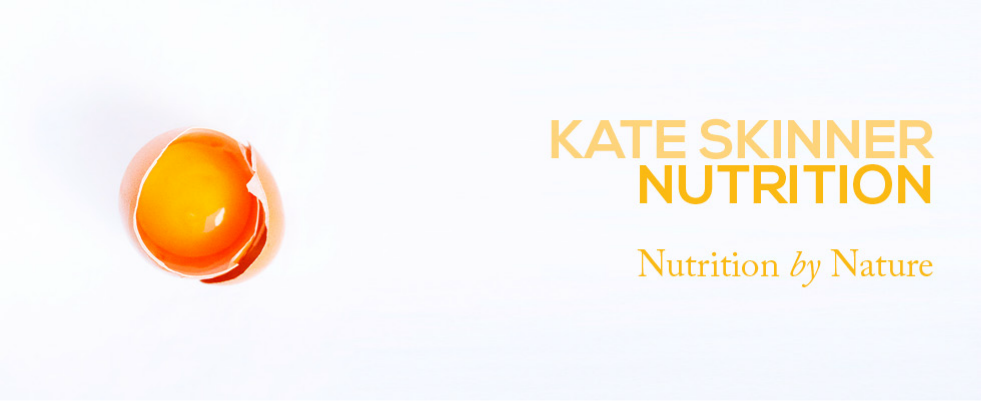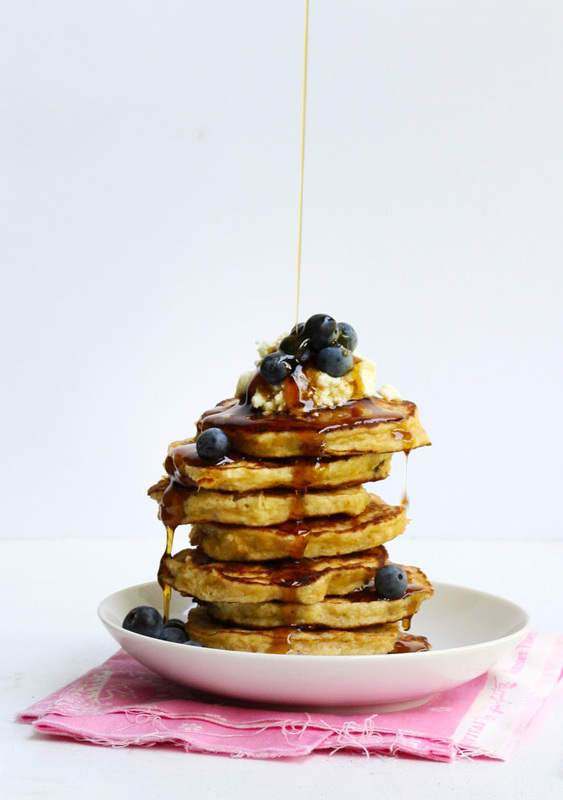|
For your monthly dose of no-nonsense nutritional advice, myth-busting and recipes, pick up a copy of delicious. magazine and flick over to my Balancing Act column. February's column sheds light on the myths and truths surrounding dietary salt, and explains why there's no need to be scared saltless. Enjoy!
5 Comments
You wouldn't necessarily think it, but night time is actually quite a stressful time for the body. Whilst asleep, you essentially 'fast'. Levels of active thyroid hormone (T3) fall and stress hormones such as adrenaline and cortisol tend to peak, often kicking in as blood sugar drops*. So when you wake, your body is actually in a bit of a state of stress and, consequently, low metabolism (lowered thyroid function). Skipping breakfast (or surviving on black coffee alone) only exacerbates this state. It's really important to get some food in first thing, to curb the stress response, boost metabolism, restock glycogen stores and effectively balance blood sugar from the get-go. Carbohydrates - including sugars - tick all these boxes (carbs restrain the release of stress hormones, facilitate the conversion of thyroid hormone to its active form thereby increasing metabolic rate, and can be utilized to restock glycogen stores), and a meal combining plenty of carbohydrates (such as starch, fruit, fresh fruit juice or natural sugar syrup) balanced with a bit of protein (dairy, eggs, etc) is ideal. Don't forget to include some sodium (salt) at breakfast too, another powerful anti-stress, pro-metabolic nutrient. *Symptoms of low blood sugar, high nocturnal stress hormone activity and low metabolism/low thyroid include: waking during the early hours of the morning with a racing mind, rapid heartbeat and/or sweat (due to adrenaline peaking); waking once or more to urinate (the body literally 'sheds' water to conserve both salt and sugar); disturbed sleep patterns; and/or lack of appetite in the morning due to elevated levels of cortisol. So. Pancakes! Banana, ricotta and coconut pancakesServes 4 1 cup self-raising flour ½ cup desiccated or shredded coconut 1 tsp bicarb of soda Pinch salt 1 egg ½ cup mashed banana (from ~1 medium banana) 100g ricotta, plus extra to serve 1 cup milk 25g butter Maple syrup and blueberries, to serve Sift flour into a mixing bowl and add desiccated coconut, bicarb of soda and salt. Whisk together egg, ricotta, banana and milk with a fork. Make a well in the centre of the dry ingredients and add wet ingredients, stirring to combine and beating out any lumps as you go. Heat a frying pan over medium-low heat and grease with butter. Pour ⅓ cup pancake batter into the pan to create one pancake (you may be able to cook 2 or 3 pancakes at a time depending on the size of your frying pan). Cook until bubbles appear on the surface of the pancake, then flip and cook for another 1-2 minutes until golden. Repeat to use up batter. Serve with extra ricotta, blueberries and maple syrup. Kate is a certified Clinical Nutritionist and offers one-on-one coaching for clients in Sydney Australia, and internationally via Skype. Visit the nutrition services page to find out more about private coaching, and be sure to subscribe via email and follow the Nutrition by Nature Facebook page for blog updates, articles, nutrition tips, recipes and special offers. Hello! Long time no blog - oops. It's been utter madness at Nutrition by Nature HQ although I hope to be getting back into the swing of things soon... expect more regular articles and Q&A posts in the not-too-distant future! Here are links to two recent pieces penned for taste.com.au: As well, I'm chuffed to be mentioned in the pages of this month's The Australian Women's Weekly magazine. (Gleefully "cutting-edge, occasionally controversial" indeed!!) Also in the works, based on the overwhelmingly positive feedback that's been coming in after last weekend's nutrition workshop in Hobart, Tasmania (thank you so much to the amazing Mel at Booty for rallying the troops and to all 120+ of you lovely people who attended!). I'll be planning some more seminars over the coming months. I'm thinking Sydney... obviously... and will also potentially line up gigs in other Aussie cities as well. So for all Australian readers, if you'd like to attend a one-off workshop in your home town and are willing to drag along a bunch of your nearest and dearest (let's uproot old dietary dogma, smash a bunch of food myths and issue some no-nonense nutrition advice for stress-free healthy living, yeah?), shoot me an email so I know that you're keen. And for international followers based in exotic locations... Bora Bora, Maui, The Bahamas... I'm willing to drag myself over your way too so register your interest accordingly. Just a few topics that we covered in the seminar over the weekend (not an exhaustive list):
What people are saying... "That session yesterday was bloody amazing. It's the best thing I've done for myself in years - I feel so much more in control of how to proceed with good health, and Kate was absolutely brilliant to listen to. Not only is she herself a picture of good health, her advice hits the right note deep down inside your gut - it's that feeling you trust that has been previously clouded by incessant incorrect and untrustworthy marketing messages about what we should and shouldn't eat for good health. Finally the clouds have parted." "Kate you did a terrific job keeping 120 of us listening, concentrating and then thinking for two hours, well done. You were really well prepared and I enjoyed the little stories you told to push a point. It was different to any other talk I have listened to on nutrition; lots of common sense backed by obvious scientific research. There is no doubt in my mind keeping stress levels down is crucial for mental health and long term wellbeing. You are a natural presenter!" "Just awesome!! Reaffirms some things I already know - eg protein shakes, coconut oil, gelatin, meats, polyunsatured fats but WOW about carb/dairy/salt/sugar in regards to being Pro-Thyroid - I have NEVER in my thyroid journey ever heard anyone refer to the thyroid in nutrition and it was so refreshing!!! Very happy I'll be enjoying some rice and potatoes with BUTTER a little more often now." Kate is a certified Clinical Nutritionist and offers one-on-one coaching for clients in Sydney Australia, and internationally via Skype or email. Visit the nutrition services page to find out more about private coaching, and be sure to subscribe via email and follow the Nutrition by Nature Facebook page for blog updates, articles, nutrition tips, recipes and special offers. Any followers out there from the Apple Isle?? I'm excited to announce that I'll be popping down to Tassie to host a Nutrition Workshop/Education Session thanks to lovely Mel at Booty (gobooty.com.au). Mel's an award-winning group personal trainer and psychologist-in-the-making who I was in touch with recently about all things health and nutrition – now we're joining forces to get the word out to the masses!
A little bit about the event, what I'll be talking about, etc (from Mel), below. Details regarding registration at the end – I hope to see some of you there!
time and effort into preparing delicious, nutrient-dense meals, and savour them in good company, you’re more likely to feel truly satisfied both physically and emotionally by the food on your plate.
A few of the below ideas were favourites from my previous snacky post (fruit + cheese will never get old!), some are updated and tweaked, and some are new. Here goes… Q & A Mondays: Thoughts on protein powders and a DIY all-natural miles-better-for-you protein shake3/3/2013 One of the common questions that I field from clients and readers is how best to avoid water retention. I see countless people who do everything they can to avoid “puffiness” (particularly women, around menstruation) in order to feel ‘leaner’ – they typically reduce salt and increase water intake drastically (which of course is what is widely recommended).
I thought I’d tackle the problems surrounding these strategies (reducing salt, increasing water) to try to combat water retention, to explain how in actual fact, they’re much more likely to amplify the problem, rather than solve it. Ultimately, decreasing sodium (salt) in the diet will increase water retention, not the other way around. Welcome to Q&A Mondays! Each Monday, I'll endeavour to answer some of the health questions sent in by readers via email, or that have been posted on the Nutrition by Nature Facebook page.
This week's questions tackle some darlings of the health food industry - quinoa, almond milk and stevia. Are they really all they're cracked up to be? |
Kate SkinnerNutritionist, Health Writer Top postsHot topics
All
|










